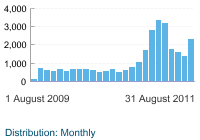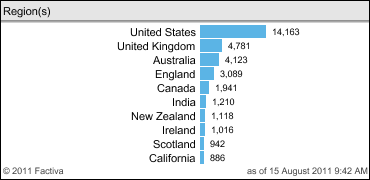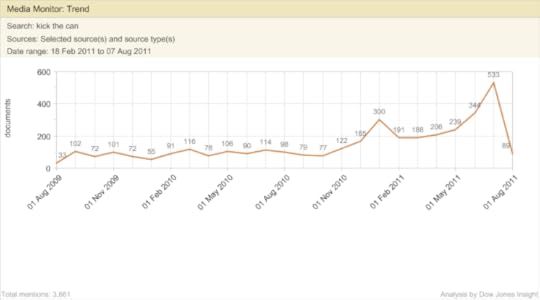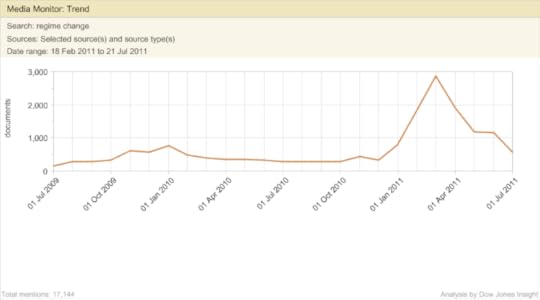Chris Pash's Blog, page 8
September 19, 2011
Cliche of the Week 63 – Outcomes
Delivering positive outcomes can be achieved as long as political expediency is not mixed with the deliverables.
Translated: there will be a result, an effect, from a planned action and someone will be better off.
In Australia, we see about 500 outcomes a week in the media, a lot of them in stories about health where everything is about patient outcomes. Apparently this is something to strive for.
Globally, the outcomes are so numerous it is hard to separate mainstream media coverage from health industry-speak, political speak and press release jargon.
"Typically, expected outcomes are well defined; regular engagement with, and reporting from, beneficiaries occurs, and the effectiveness of the philanthropic activity is reviewed." (Banking Day, September 6)
"Boyd Swinburn from Deakin University says the declaration started strong, with outcomes and targets and accountability mechanisms, but they have since fallen by the wayside." (ABC, September 6)
"The group lapsed two years later after no outcomes resulted from their efforts, which included writing more than 100 letters to people, including local councillors and state ministers." (Newcastle Star, September 6).
Cliche of the Week appears in The Australian newspaper Mondays. The usage of cliches in the media is tracked across the world using Factiva and Dow Jones Insight.
Chris Pash's book, The Last Whale, a true story set in the 1970s, was published by Fremantle Press in 2008








September 11, 2011
Cliche of the Week 62 – Feral
The word feral swept into British newspaper coverage as quickly as the London riots started.
But it's Australians who love the untamed descriptor, with local journalists using the word on average twice as much as their British counterparts.
Last month, feral grubbed into the mainstream media 1800 times, mostly in the British media and lately linked with underclass and criminal. Two years ago, it was less than half that.
Australians use the word creatively and not just to describe exotic animals or rabbits that have gone bush.
"(Collingwood coach Mick) Malthouse yesterday said he had no intention of being part of the club's campaign against feral crowd behaviour" (The Courier-Mail, August 17).
The weather: "Quite frankly it looked feral" (The West Australian, August 1).
"Another schoolgirl had red paint poured over her clothes and pencil case, and her school books torn to shreds. The third was verbally abused, being called feral and a dog" (Herald-Sun, August 19).
"Pinot noir with its slightly feral characters" (The West Australian, July 28).
"Investors become acutely aware of just how much is beyond their control whenever sharemarkets turn feral" (The Australian, August 31).
Cliche of the Week appears in The Australian newspaper Mondays. The usage of cliches in the media is tracked across the world using Factiva and Dow Jones Insight.
Chris Pash's book, The Last Whale, a true story set in the 1970s, was published by Fremantle Press in 2008








September 4, 2011
Cliche of the Week 61 – Informed Sources
News sources are expected to be informed, well placed, reliable, high level, close to the action or even insiders with special knowledge.
They become anonymous when they have information that should be public but cannot be named for a variety of reasons, including that being exposed would cause them personal damage.
Using a poorly informed source would be a sin. Branding sources as "informed" or even "well informed" is a form of gluttony to increase the girth or grandness of what is simply a "source".
"Informed sources" appears in the mainstream media about 800 times a month, mostly in South Asian and US newspapers. In Australia, the phrase slips into print about 10 times a month.
"Well-placed" sources surface about half as much and there are even fewer "well-informed sources".
"Several well-informed sources within the conference" (St Louis Post-Dispatch, August 30)
"The rookie Bronx judge who has been allowing violent criminals to walk free without bail despises her job — and hopes she'll force a transfer from the rough-and-tumble Criminal Court to the cushier civil division, a well-placed source told The Post." (The New York Post, August 31)
Cliche of the Week appears in The Australian newspaper Mondays. The usage of cliches in the media is tracked across the world using Factiva and Dow Jones Insight.
Chris Pash's book, The Last Whale, a true story set in the 1970s, was published by Fremantle Press in 2008








August 28, 2011
Cliche of the Week 60 – Strongman
Military strongmen have increasingly been elbowing their way into mainstream media coverage over the past few months.
Late last year, "strongman" was appearing around 600 times a month in news reports. But in March, the word surfaced more than 3000 times as the strongman of the Libyan kind faced rebels.
The word is often linked with "military" and is similar to "ruling military junta", itself a cliche and tautology. A junta is a group of military rulers. No need for "ruling" or "military".
"Tripoli celebrated into the early hours of Wednesday after rebels overran Muammar Gaddafi's compound, despite finding no sign of the Libyan strongman or his sons." (Agence France-Presse, August 24)
"The forces, used for decades by the strongman to quell internal dissent and protect his regime, are blamed for much of the violent crackdown against street protests in the spring." (The Wall Street Journal, August 24)
"Israel has co-ordinated the movement of Egyptian troops in the peninsula with the ruling military junta in Cairo since February, allowing up to five battalions in the peninsula." (Washington Times, August 23)
Cliche of the Week appears in The Australian newspaper Mondays.
Chris Pash's book, The Last Whale, a true story set in the 1970s, was published by Fremantle Press in 2008








August 21, 2011
Cliche of the Week 59 – Legend
Legends, the essence of brave histories, are created daily in the worlds of sport, music, motoring and civil society.
Globally, legends are reported about 1800 times a month in music, soccer, gold, baseball and in the cinema. Australia and New Zealand have legendary status across rugby, soccer, cricket and horse racing.
"Legendary Test five-eighths Mark Ella and Stephen Larkham believe Wallabies selectors cannot afford to leave Matt Giteau out of the 30-man squad for the Rugby World Cup." (The Northern Territory News, August 17)
"The team have entered both Roly Dixon and Kiwi rally legend Mike Marshall, who is making his first-ever off-road race start." (The New Zealand Herald, August 17)
"She (Poppy Olsen) relished the opportunity to ride with American skate legend Tony Hawk." (Wentworth Courier, August 17)
Soccer: "The rebirth of the New York Cosmos, a once-glamorous American institution, brought us legends Pele and Eric Cantona." (The Straits Times, August 17)
"It's been 29 years since the psychedelic soulman (Sly Stone) last made a record, but one spin of "I'm Back! Family & Friends" establishes that the funkified 60s legend is still relevant." (The New York Post, August 16)
Cliche of the Week appears in The Australian newspaper Mondays.
Chris Pash's book, The Last Whale, a true story set in the 1970s, was published by Fremantle Press in 2008








August 14, 2011
Cliche of the Week 58 – Learning Curve
Learning curves are rarely gentle, life-long conquests of knowledge mountains.
The mainstream media reports short and steep curves mostly in the sporting world and mainly in the US where American footballers apparently have a lot to learn.
"Learning curve" has consistently appeared in reportage up to 1600 times a month.
"All of the rookies had a large learning curve coming into training camp, but the rookie-free agents didn't even know what kind of playing style they would be needed for when the NFL lockout finally ended." (The Arizona Republic, August 8 )
"While he admits it has been a steep learning curve, (drinks company executive Alan) Herrod believes it (Australia) will prove to be a very lucrative market for his company which currently exports 20 per cent of its output." (Scottish Business Insider, August 8 )
"(Claudia) Schiffer said she was on a steep learning curve and admitted she still had much to learn as a designer." Reuters News, July 7)
"All nine teams were on a steep learning curve in Saturday's light winds that would have left traditional monohulls stalled in the water." (Plymouth Herald, August 8 )
Cliche of the Week appears in The Australian newspaper Mondays.
Chris Pash's book, The Last Whale, a true story set in the 1970s, was published by Fremantle Press in 2008








August 7, 2011
Cliche of the Week 57 – Kick the Can
Putting off until tomorrow or the day after or sometime in the future is an age-old strategy to avoid hard choices and leave the hangover for someone else.
The latest way to describe this is "kicking the can down the road", a phrase reminiscent of childhood street games with a tin can.
The more serious game of US debt led to widespread use of the phrase in the mainstream media. Usage hit 500 times a month last month from about 100 two years ago.
"Mr Obama is often known to agree that lawmakers are too apt to 'kick the can down the road' rather than confront difficult issues." (The New York Times, August 3)
"The outstanding irony of the entire debate is that, despite the participants' declared intention not to merely 'kick the can down the road', that's what they've done." (The Los Angeles Times, August 3)
Eventually, the can stops rolling. Take the case of Jefferson County, Alabama, which faces bankruptcy after "clever" financial derivatives backfired into a debt mountain. "Welcome to Jefferson County. This is the end of the road, where the can cannot be kicked any farther." (The New York Times, July 30)
Cliche of the Week appears in The Australian newspaper Mondays.
Chris Pash's book, The Last Whale, a true story set in the 1970s, was published by Fremantle Press in 2008








July 31, 2011
Cliche of the Week 56 – Bucket List
A bucket list, now an essential element in life plans, can sometimes include a post-life list.
The phrase soared into usage in late 2007 with the release of the movie Bucket List, starring Jack Nicholson and Morgan Freeman.
Usage peaked in 2008 when it appeared in news reports more than 1000 times a month. It dropped off after that but recently has been spotted in 500 news reports a month from about 200 two years ago.
"Jack Nicholson, we are told, is toying with the idea of being suspended from a tree and picked apart by vultures when he dies. It's called a sky burial, an old American native practice, and the actor reportedly told German television last year that being disposed of in such a manner could be on his post-bucket list." (Calgary Herald, July 12)
"Coolmore founder John Magnier doesn't have many dreams unfulfilled left in racing but Australasia's weight-for-age championship, the Cox Plate, remains on his bucket list." (The Sydney Morning Herald, July 4)
"The marathon was part of his bucket list, if you want to call it that." (Sunshine Coast Daily, July 26)
Cliche of the Week appears in The Australian newspaper Mondays.
Chris Pash's book, The Last Whale, a true story set in the 1970s, was published by Fremantle Press in 2008)








July 24, 2011
Cliche of the Week 55 – Regime Changes
(With thanks to Peta Dixon for suggesting this week's cliche)
Regime changes, as reported by the mainstream media, have accelerated in the world since January.
This transformation description surfaced 300 times last December but in March was being machine-gunned into news reports 2800 times. Usage has dropped since but still appears 600 times a month.
The revolutionary trend can be partly attributed to the Arab Dawn, an explosion of pro-democracy sentiment in the Middle East. "Arab Dawn" is being used a moderate 12 times a month.
"It was a sharp escalation in pressure on Assad and a sign that the Obama administration could be moving closer to calling for regime change in Syria over the violent crackdown on a four-month-old uprising." (The Jakarta Post, July 21)
"In recent weeks, Stephen Conroy, the Communications Minister, has accused Mr Murdoch's Australian newspapers of waging a campaign for 'regime change'." ( Financial Times, July 21)
Regime changes can also be a cultural shift. "As a "crystallisation" of regime change, (author Paul) Murray cites the old Bank of Ireland offices in Dublin — once the HQ of a shattered bank, but now earmarked as the site of a planned National Literary Centre." (The Independent, July 15)
Cliche of the Week appears in The Australian newspaper Mondays.
Chris Pash's book, The Last Whale, a true story set in the 1970s, was published by Fremantle Press in 2008)








July 17, 2011
Cliche of the Week 54 – Foregone Conclusion
As the anticipated dark clouds of gloom gather closer, it appears we believe that bad times are a foregone conclusion.
While not all futures are negative, we believe in foregone conclusions when it comes to sport, politics and the corporate world.
"Foregone conclusion" has consistently been used in the world's mainstream media up to 650 times a month in the past two years.
Five years ago, "foregone conclusion" surfaced in reporting half as many times as today.
"We don't get many chances to root for a team for which the regular season is a formality and the playoffs are a foregone conclusion." (Philadelphia Daily News, July 13)
"The Democrats eight-point lead also is far below the 25-point margin Mrs Harman ran up in her last election, and few consider Tuesdays result a foregone conclusion." (The Washington Times, July 13)
"But Prof Kumar is adamant that the establishment of a fourth campus is no foregone conclusion." (Financial Times, July 11)
"Regardless of his final decision, the growth of FIFO workforces in Queensland is a foregone conclusion." (The Courier-Mail, July 11)
"Lorenzo Meyer, a political scientist at the College of Mexico, said that while the vote in Mexico state seemed a foregone conclusion, the presidential election was not." (Reuters, July 2)
Cliche of the Week appears in The Australian newspaper Mondays.
Chris Pash's book, The Last Whale, a true story set in the 1970s, was published by Fremantle Press in 2008)















